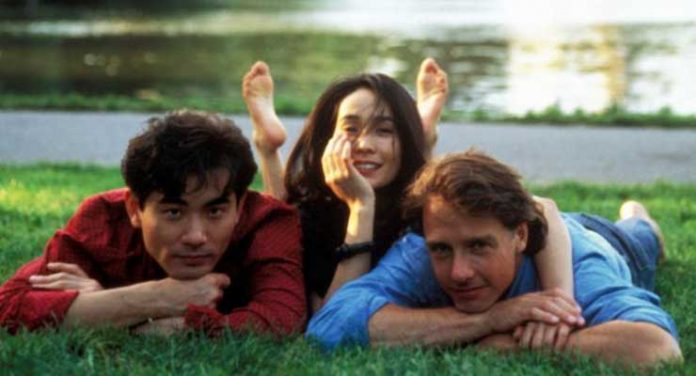
Wai and Wei-Wei hatch a plan: they will get “married” at the Manhattan courthouse, she will get her green card and he will later return to Simon (who has been temporarily banished to a downstairs bedroom). The older Gao’s are bitterly disappointed by the no-frills civil ceremony and when the four, accompanied by the loyal Simon, go to an elegant Chinese restaurant, the maître d’ Old Chen (Tien Pien) turns out to be Mr. Gao’s old army buddy. Against the remonstrations of Wai and Wei-Wei, Chen insists on throwing them a proper wedding banquet the following day.
What started out as a very small affair quickly mushrooms into a huge event, much to the discomfiture of Wei-Wei, Wai-Tung, and Simon. Shades of La Cage Aux Folles in which a middle-aged gay man must temporarily pass himself off as “straight,” to his son’s prospective in-laws, The Wedding Banquet uses some similar plot devices to comic effects as the “newlyweds” must keep up their charade at least until Wai-Tung’s parents return home. The film’s final act turns to more serious issues like the roles of women in society, the importance of children (especially grandchildren), and the acceptance of what people cannot change about their natures.
Writer/director Ang Lee has run the gamut of cinematic genres from the classic action drama Crouching Tiger, Hidden Dragon to romantic comedies like Eat, Drink, Man, Woman. The Wedding Banquet was just his second feature-length film and already demonstrated his deft handling of script and pacing. A splendid cast, abetted by Jong Lin’s spot-on cinematography, and veteran film composer Mader’s evocative score, makes this a heart-warming film from beginning to end.
[envira-album id=”104759″]
The Video
For a twenty-five year old film, shot in 35 mm, this renovated release looks mostly stunning with great colors and natural appearing details. There is little grain and blur, and just a touch of crush in the few dark scenes.
The Audio
Although billed as a DTS-HD Master Audio 2.0 soundtrack, it is simply glorious mono with zero action in the extra channels. That said, the dialogue is very clear in both English and Mandarin (don’t worry, there are English subtitles)
The Supplements
There are the following video extras:
- A Forbidden Passion Featurette (DTS-HD Master Audio Stereo) (19:35). Ang Lee described the making of this film, his entry into the film business, and the subject of the gay lifestyle, with clips from the current film.
- Theatrical Trailer
The Final Assessment
I have been a massive Ang Lee fan from the beginning, but inexplicably missed The Wedding Banquet during its initial release. Olive Films makes up for lost time with this splendid reissue that will delight Lee’s many fans and bring new ones into the fold. Highly recommended.
The Wedding Banquet is available on Blu-ray from Olive Films August 29, 2017.
[amazon_auto_links id=”104756″]
[youtube httpss://www.youtube.com/watch?v=5kVkRhXt3S4?ecver=2]
Be the first to leave a review.

